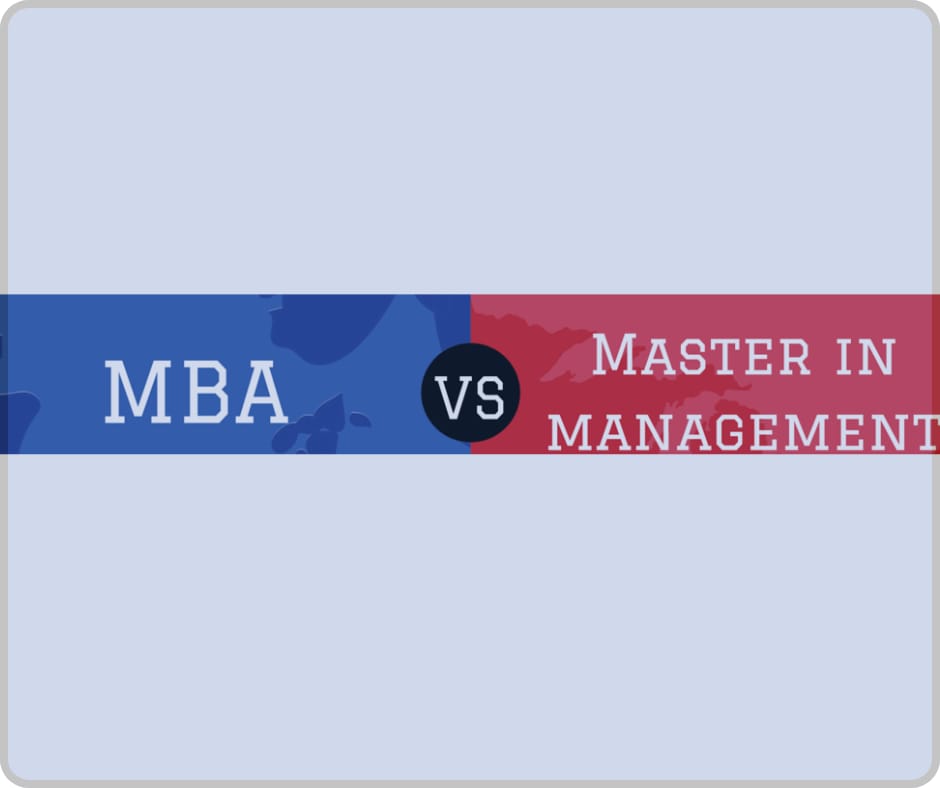In today’s globalised world, young professionals face cut-throat competition as they endeavour to climb the corporate ladder. A higher education business degree empowers them to advance their careers while growing personally and professionally. Aspiring professionals hoping to pursue a business management course have two options – a management master’s and an MBA. Let’s better understand the difference between an MBA and a master’s degree in management to help you decide on the best way forward.
Masters in Management vs MBA – An Overview
Both courses fall under the business education umbrella. However, they differ in their structure, target demographics, and more.
What Is a Master’s in Management (MiM)?
MiM programs focus on building a strong foundation in management principles and leadership skills. Offering a broad understanding of multiple business functions, the course best suits recent graduates and young professionals. The MiM program helps graduates enter the workforce and secure entry-level managerial roles. Students pursuing an MiM have the opportunity to gain a comprehensive understanding of crucial business fundamentals over the course of a year. These programs are known for their academic rigour and focus on theoretical concepts.
Understanding the MBA
A Master of Business Administration (MBA) degree has long been the popular choice for those looking to accelerate their careers or transition into leadership roles. The comprehensive program is tailored to meet the requirements of professionals with significant work experience. MBA courses offer a deep understanding of specialised business areas like finance, marketing, operations, and strategy. The idea is to offer students a holistic view of the business landscape. MBA courses focus on practical learning, identifying real-world applications of taught business concepts. Students also gain opportunities to network and develop critical thinking, problem-solving and decision-making skills.
MiM vs MBA – Key Differences
Curriculum Focus
MiM programs cater to recent graduates and those with limited professional experience. The course aims to provide a strong foundation in management principles while offering insights into core business disciplines such as finance, marketing, operations, and strategy.
MBA programs attract professionals looking to upgrade their careers or move to a different industry. The curriculum tends to be more specialised than MiM programs, offering advanced courses tailored to specific career paths or industries. MBA courses encourage students to apply theoretical knowledge to real-world challenges.
Duration and Structure
Most MiM courses are designed to last one year, making them an attractive option for those who want to kickstart their careers. These programs often follow a structured curriculum with limited flexibility in course selection.
MBA programs usually span two years, although accelerated options may be available for experienced professionals. The structure of MBA programs allows for greater customisation. Students can choose elective courses, concentrations, and specialisations based on their interests and career goals. MBA students can also study part-time or online, enabling them to balance their education with professional commitments.
Career Outcomes
MiM programs are ideal for those hoping to start work immediately after graduation. The course provides them with the skills and knowledge needed to succeed in entry-level management positions.
MBA programs help accelerate career progression and unlock new opportunities for mid-career professionals. The course provides the tools, network, and credibility individuals require to advance within their current organisation, transition to a different industry, or launch an entrepreneurial venture.
The choice between an MBA vs master in management depends on the student’s circumstances, career aspirations and learning preferences. Both MiM and MBA programs offer invaluable opportunities for personal and professional growth.
MBA or MSc – Which Is Better?
Some students struggle to choose between an MBA and a Master of Science in a business-related field while exploring higher education options. Let’s help you make an informed decision.
Specialisation vs Generalisation
MBA programs provide a broad understanding of multiple business functions, including finance, marketing, operations, and strategy. On the other hand, an MSc program offers an in-depth explanation of a specific discipline, such as finance, marketing, or entrepreneurship.
Career Trajectory
Individuals hoping to advance to senior leadership roles often prefer an MBA. On the other hand, those aiming for careers in research, consulting and academia might pursue an MSc instead.
Learning Format and Flexibility
MBA programs provide significant flexibility in terms of learning format. Students can accommodate their needs and professional commitments with options for full-time, part-time, and online formats.
Financing Your Higher Education Abroad
Finalising the ideal course is the first step of your higher education journey. Next, you must consider how to finance it. Several young Indians opt to pursue their MBA and MiM at the best universities in India and abroad. Instead of relying on family finances, these individuals apply for education loans instead. Education-focused lenders like Avanse provide educational loans for studying abroad and in India. They provide up to 100% financing and a student-friendly education loan rate of interest. Applying for an education loan empowers young professionals to grow their careers on their own terms.
Indians looking to build a better future for themselves in business and management can choose to pursue an MBA or MiM. By evaluating your options and understanding the crucial difference between master’s and MBA, students can make the ideal choice for themselves. Regardless of the course they choose, young Indians can opt to finance their higher education with a student loan.
